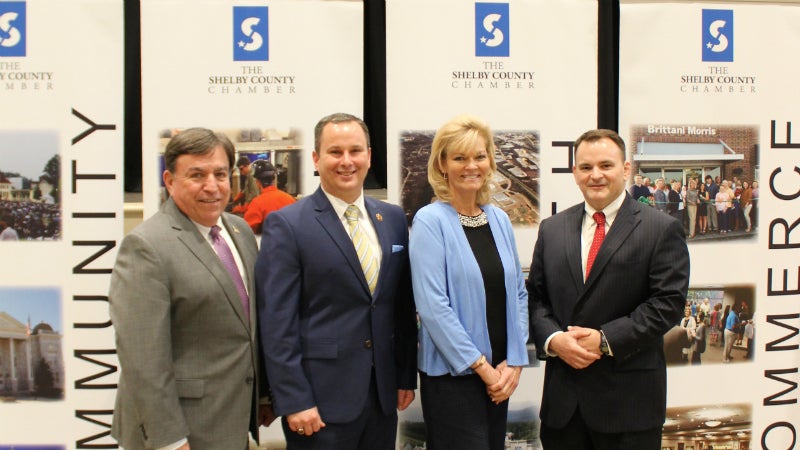Compact 2020 continues fight against youth drug abuse
Published 3:18 pm Thursday, February 6, 2020

- Compact 2020 Director Clay Hammac, second from left, is shown with Sheriff John Samaniego, Shelby County Chamber Board President Chairwoman Kathy Copeland and former director Alan Miller. (CONTRIBUTED)
COLUMBIANA – Capt. Clay Hammac, director of Compact 2020, urged business leaders on Thursday, Feb. 6, to continue building and strengthening the partnerships that have allowed for the success of the drug-fighting organization.
“It could not exist without collaboration,” Hammac said during The Shelby County Chamber’s Connections Luncheon at the Shelby County Arts Center Grande Hall.
Compact 2020 was formed in 2016 in response to the growing problem of youth abusing drugs—and a realization that a trailblazing solution was needed.
“We had students who were overdosing and dying from opioid abuse, prescription medications,” said Hammac of the Shelby County Sheriff’s Office. “We were not going to arrest our way out of this.”
Ninety percent of those struggling with substance abuse started using when they were teenagers, Hammac said. So, Compact 2020 gathers information about drug use among young people and then seeks to intervene by meeting with families and forming action plans to get the youth “back on track.”
“We want moms and dads to know what we know from our investigative efforts,” Hammac said.
Partnerships with organizations such as Central Alabama Wellness are critical to the effort because substance abuse issues often correlate to mental health issues, Hammac said.
Also, Compact 2020 has formed community groups so that leaders in each of Shelby County communities can meet to discuss the unique issues, and possible solutions, at their location.
Since its inception, Compact 2020 has identified 630 students who were involved in substance abuse or deemed at-risk to become so, Hammac said, and worked with them and their families to avoid further problems.
“Our job is to clear the docket for the juvenile justice system, and we’re at least going to try our hardest to do that,” Hammac said.
Hammac said youth are influenced by messaging about what should be considered safe and healthy behavior, as drug use and other dangerous activities are normalized.
“Our kids are really under attack,” Hammac said and added that anxiety and depression caused by societal pressures of social media also factor into the equation. “The goal is not one more death notification for one of our students,” Hammac said.









